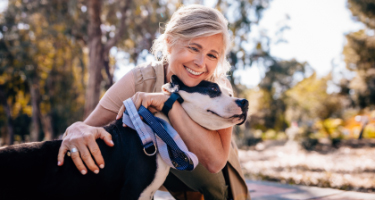Diarrhoea is a common condition in dogs that can have devastating effects if not treated properly. Pet owners should be familiar with treatments for mild cases and what signs to look for if their pet is struggling with this condition.
What causes diarrhoea in dogs?
It can be challenging to figure out if diarrhoea in dogs is a cause or symptom of an illness or disease. Usually, several conditions can cause diarrhoea in dogs.
To help you better understand, here are the most common causes of diarrhoea in dogs that you should be aware of.
Diet
Dogs, especially puppies, have digestive systems that are sensitive and still developing. Sudden changes in diet can result in diarrhoea alongside your dog's regular food intolerances and allergies. It's best to confirm with your vet whether the food you've selected is best for your dog's bowel movements or if they need specially formulated dog food instead.
Additionally, curious dogs may ingest things they find on the ground and around them that may be toxic or harmful to their body.
Parasites
Dogs, especially when they are young, are prone to parasites. Puppies can even carry intestinal parasites from their mothers after birth. They can also pick up parasites from their environment or infected water outside.
Parasites may include:
- Roundworms
- Hookworms
- Whipworms
- Tapeworms
- Giardia
All parasites should be treated immediately by a veterinarian to avoid any long-term health effects.
Stress
Stress can be a direct underlying cause of your dog's diarrhoea. Your dog's ability to adjust to a new household, schedule and family can have a direct impact on your dog's health. Increased stress can also come from other pets in the house and unexpected sounds or smells.
When bringing home a new puppy you can help them overcome stress by getting them used to your home, feeding them regularly, going for a walk at least once a day, establishing a regular schedule and providing plenty of love and care.
Viral and Bacterial Infections
Unvaccinated dogs may be more susceptible to harmful bacteria and viral infections. Viral infections should be addressed immediately to prevent unsavoury outcomes.
Diarrhoea in dogs can be the result of bacterial infections such as Salmonella, E. coli, and Clostridium
It can also be the result of some common dog diseases like parvovirus, distemper and coronavirus. Other symptoms include severe vomiting, fever, lethargy or lack of appetite.
How serious is dog diarrhoea?
Whether your dog has a mild case or experiences chronic diarrhoea, every case of dog diarrhoea should be considered a serious health issue.
While mild cases can be resolved quickly, when it comes to more severe cases of diarrhoea, you should contact your veterinarian immediately.
Depending on your vet's assessment, severe cases may be a symptom of:
- Inflammatory bowel disease
- Liver disease
- Diabetes
- Pancreatic disorder
- Mild intestinal distress
- Kidney disease
And once the diagnosis is known, treatment for your dog may include specially formulated dog foods, medications prescribed and even surgery.
How to Stop Diarrhoea in Dogs
Dog Diarrhoea Treatment
If your pet is experiencing a loss of appetite, is lethargic, vomits frequently or is showing signs of abdominal pain in addition to having diarrhoea, then it's time to contact your vet.
Your vet may suggest an at-home treatment for the first 24-48 hours. It's important to note that this time frame is dependent on the age of the pet, level of dehydration, pre-existing medical issues and any other abnormalities in your pet's symptoms.
Your vet may recommend your pet fasts for a specific amount of time. Throughout this period you should make sure to:
- Leave water readily available to your dog
- Give them ice cubes to lick if they don't want to drink water
- Give your dog's gut enough time to rest and reset
- Keep your dog hydrated
After fasting, you should gradually reintroduce solids and incorporate them into a bland diet for your dog (under your vet's supervision).
Many vets recommend plain cooked white rice, plain boiled chicken, canned plain pumpkin and natural yogurt to help your dog's upset tummy. Make sure to confirm with a vet that your pet is not allergic to any of these ingredients before feeding them.
When to See the Vet for Diarrhoea
If it's been longer than 48 hours then immediate veterinary attention will be required. This is even more important for puppies, geriatric dogs or dogs with chronic diseases.
If your vet diagnoses your dog with a bacterial infection, viral infection or a parasite they may have to be hospitalised to recover.
Fluids may be given if your pet is dehydrated, antibiotics may be used for a bacterial infection and antiparasitic medication for a parasitic infection. Prescribed drugs, other over-the-counter medications and in some instances human medications may be used to help alleviate several different symptoms.
Dog Diarrhoea Prevention
One of the best ways to prevent diarrhoea is by making sure your dog has plenty of healthy and balanced food. When starting a new diet, make sure you transition your dog slowly as sudden changes in your dog's diet may leave them feeling unwell.
All your dog's food should be treated or processed to reduce harmful bacteria. You should avoid feeding your dog table scraps and dog bones to stop them from scavenging or eating garbage when on a walk.
Make sure that your dog is exercised daily in your dog's routine. Establishing a routine for sleeping and exercising will help to desensitise your dog to its surroundings and settle more comfortably in your home.
You should create a stress-free environment for your dog that's clean, disinfected and well-kept. Your dog should still feel safe even if it is around other animals or small children in your family.
Talk regularly with the right vet for your pet about staying up to date on your dog's worming, vaccinations and parasite prevention. You can also partner with your vet to create a proactive health plan for your dog.
Dog diarrhoea requires pet owners to monitor their dog's health from day to day. So if your dog is showing signs of severe diarrhoea, then make sure that you seek veterinary advice or go to the nearest emergency animal hospital immediately.
Key Takeaways
We understand how stressful it can be when your dog is unwell. And with the help of your vet, treating your dog's upset tummy doesn't have to be a terrible task.
You can start by narrowing down what you think may have caused your dog's diarrhoea. Then, once you contact your vet they'll be able to determine whether your dog needs an at-home treatment or if they need immediate veterinary attention.
Once you've seen the vet you can work with them to put a prevention plan in place.
As part of your prevention plan, you may also consider pet insurance. Not only does it provide peace of mind but it can also help cover the costs of future health issues.






